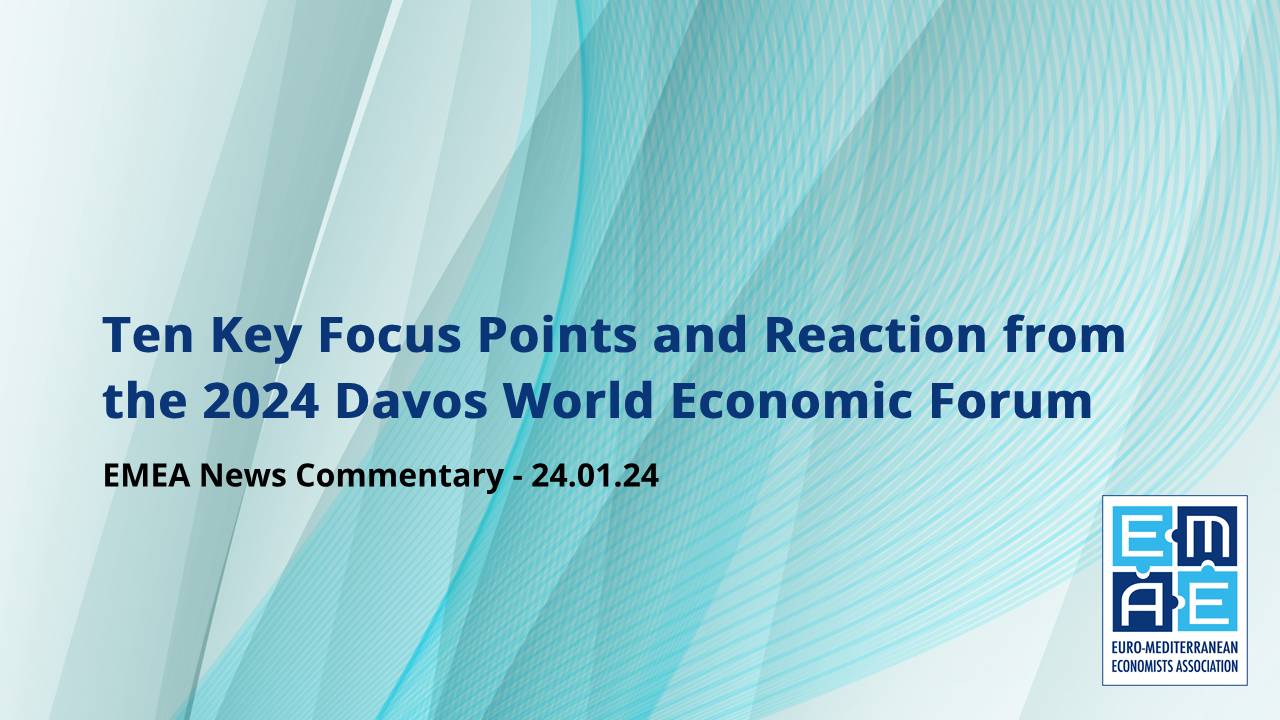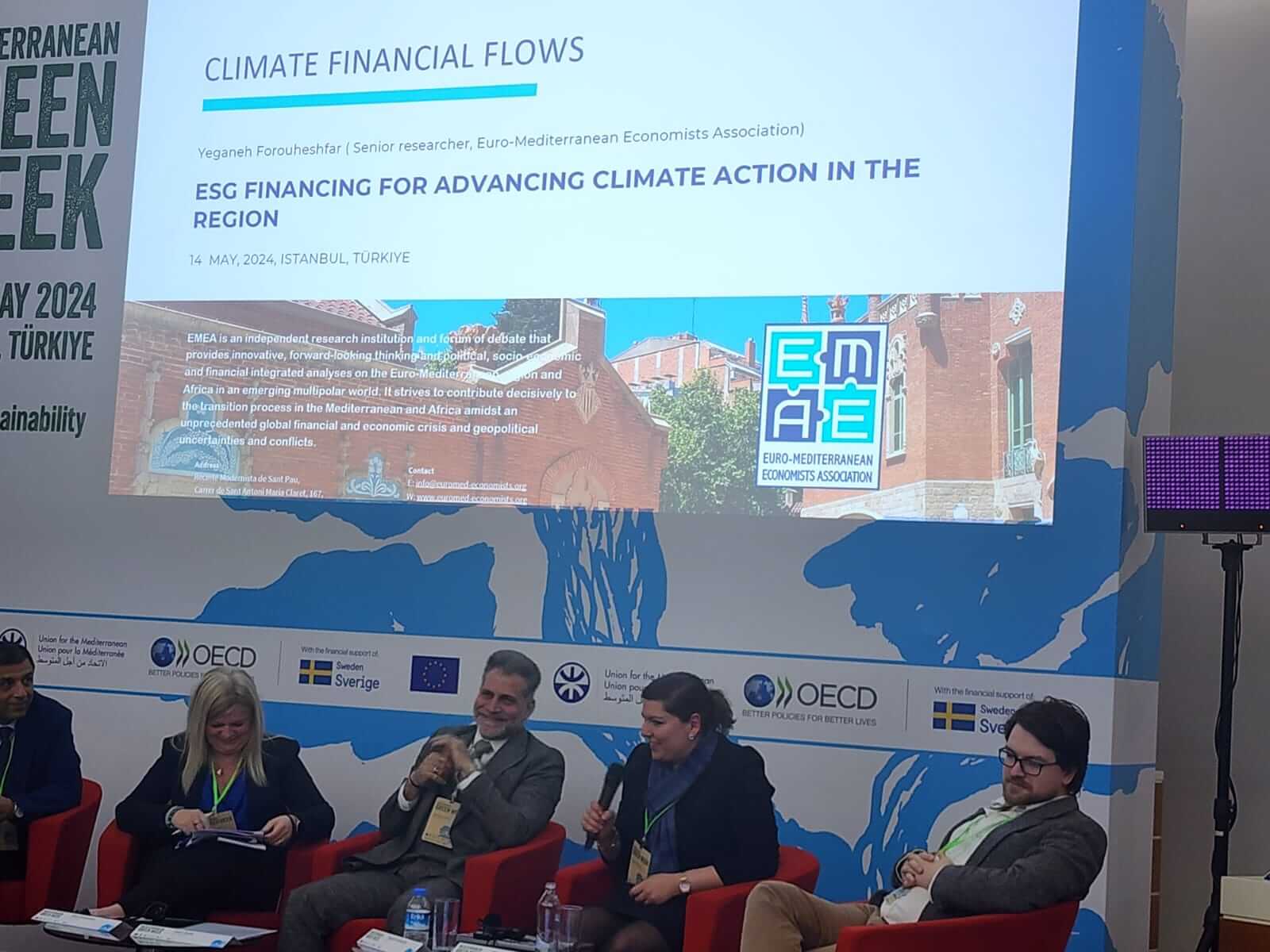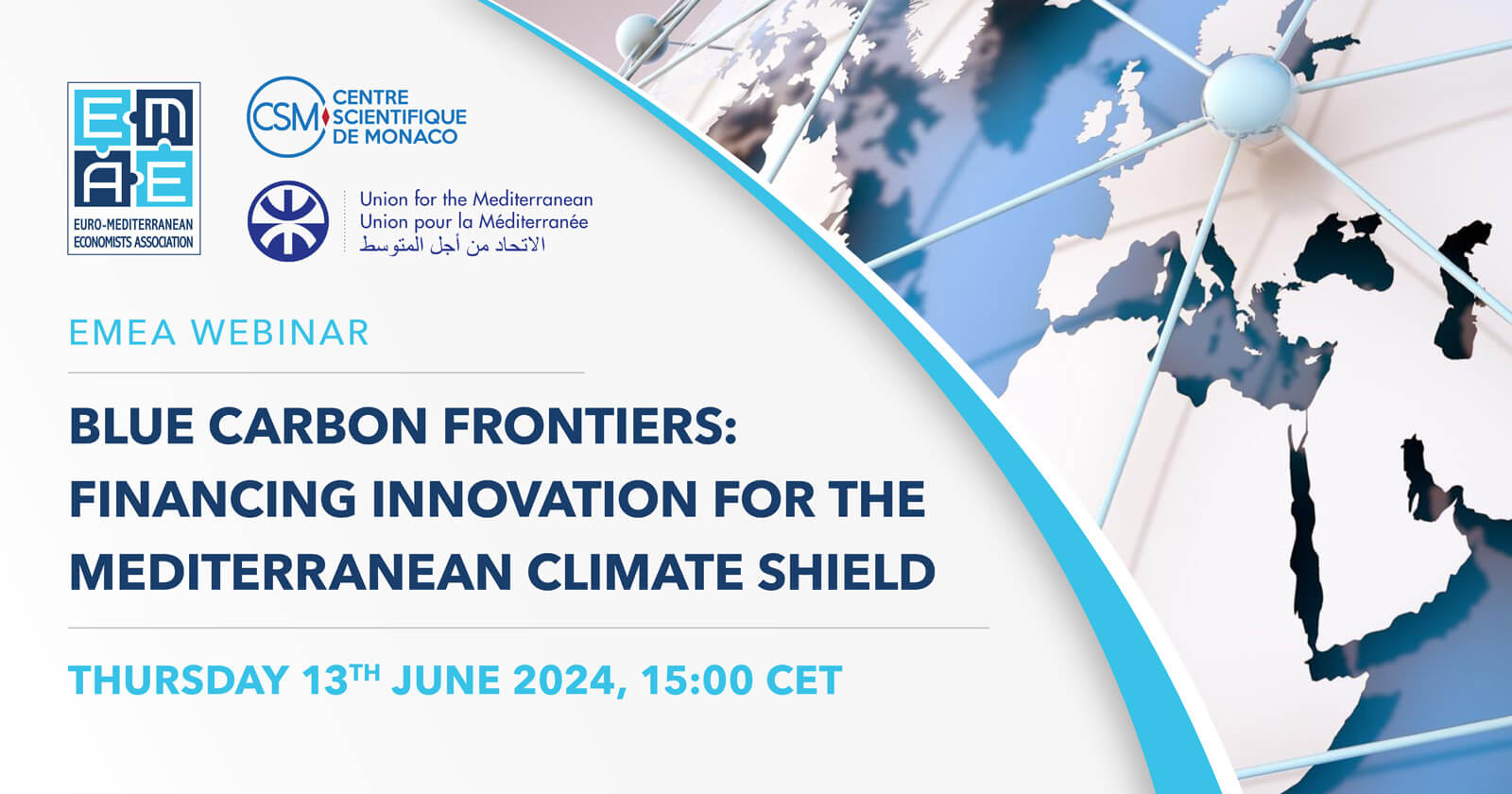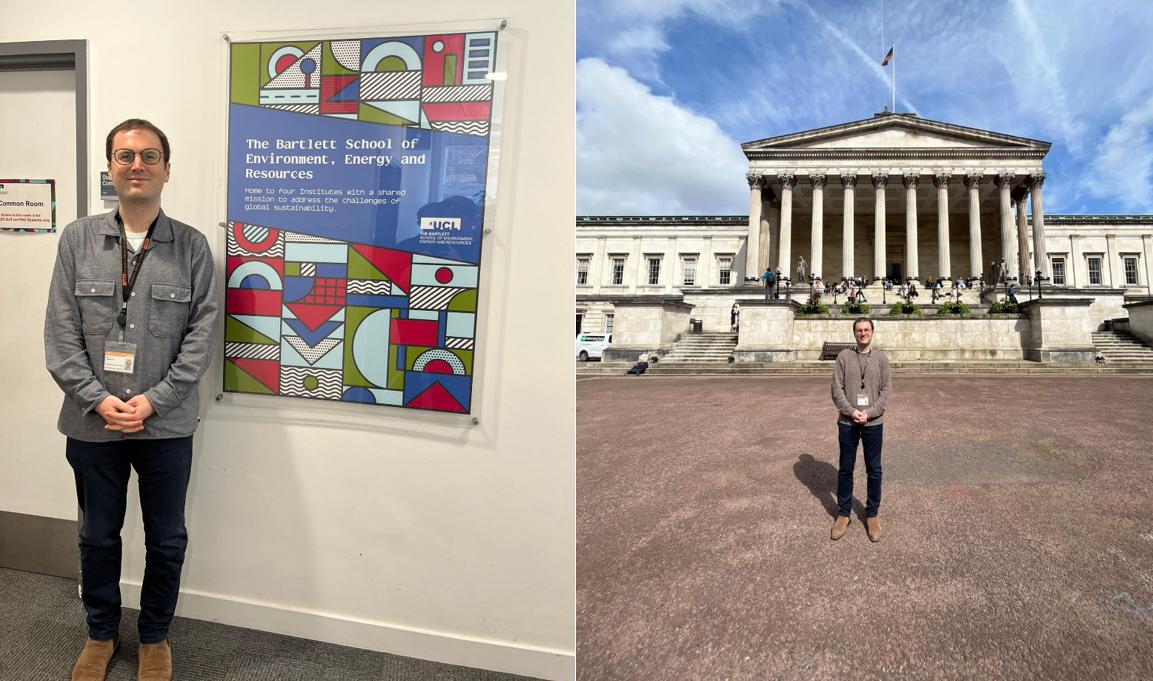World leaders and prominent business figures have now departed a freezing Davos in Switzerland after the 54th annual meeting of the World Economic Forum – the largest in WEF history.
Whilst the event drew criticism for being elitist and expensive, according to Reuters, it remains a relevant gathering, providing useful insight into “how the rich and powerful react to the most pressing issues.”
After a week “of high stakes meetings” these were their main observations from the issues discussed:
1. Stalemate in the Middle East
This year’s agenda was dominated by events in the Middle East – but no progress was made on finding ways to bring about a ceasefire in the Israel/Hamas war or how to create a future Palestinian state.
The head of the Palestine Investment Fund told a WEF panel event that at least $15 billion alone would be needed to rebuild Gaza’s housing infrastructure. But Arab states had no inclination to assist with funding until a lasting peace could be negotiated.
In the meantime, the entire region’s economy was said to be faltering.
“We agree that regional peace includes peace for Israel, but that could only happen through peace for the Palestinians through a Palestinian state,” said Saudi foreign minister Prince Faisal bin Farhan.
2. Red Sea remains a black spot
It was reported that continued attacks on Red Sea shipping by the Iran-aligned Houthi group in Yemen would make transporting goods from Asia to Europe far more costly. Yemeni and Iranian officials have said there will be no end to hostilities until Israel ended the war in Gaza. Meanwhile, the talk amongst CEOs in Davos was about taking alternative supply routes to avoid the Red Sea – namely around southern Africa.
3. China “open for business”
China’s Premier Li Qiang said that his country’s economy was open for business, encouraging foreign investment. Despite this, Reuters reported that investors “remained cautious”, as a result of China’s tensions with the United States, along with a lack-lustre post-pandemic recovery.
4. Questions over monetising Artificial Intelligence
Although Artificial Intelligence (AI) was a hot topic – ranging from the opportunities it offered in scientific discovery, to how it should be regulated and concerns over security – the bigger issue appeared to be how AI could be monetised.
5. Capitalism to the rescue of debt restructuring
A number of debt-ridden countries used Davos as an opportunity to further their debt restructuring plans. Amongst these was Argentina’s newly elected President Javier Milei, who met with Kristalina Georgieva, managing director of the International Monetary Fund’s to discuss his country’s debt position. “Free enterprise capitalism is the only tool we have to end hunger and poverty,” said Milei.
Ghana was also reported to have re-engaged with international bondholders, building on recent progress made over alleviating the country’s debt pile.
6. Global economic concerns
Fears regarding the World economy remained, with global bank chiefs warning of inflationary pressures. Their concerns were linked to the possibility of rising oil prices and increased shipping costs, especially given the current problems in the Red Sea. Reuters reported that Bank executives were concerned that the market had mispriced interest rate cuts, with geopolitical risks expected to cause further volatility.
“It’s a big year in general with many elections around the world which could change potentially the way fiscal stimulus is handled around the globe,” said Suni Harford, President of Asset Management and Group Executive Board Lead for Sustainability and Impact at UBS.
7. The future for European Banking
Although private conversations took place amongst executives regarding European Bank consolidation, nothing substantial was forthcoming. This was put down to cross-border mergers not being viable “without uniform regulation across the region.” Selective mergers of key national players, however, would appear to be a more realistic option.
8. Energy: No end in sight to peak oil as decarbonisation discussions continue
Whilst several panel sessions focused on ending fossil fuels, the head of Aramco dashed the hopes of many delegates, after telling Reuters that peak oil demand would not be happening in the foreseeable future. It was reported that there were fewer energy executives attending Davos this year, although oil bosses from Shell, TotalEnergies and Aramco did meet “to discuss how to help decarbonise industries they supply.”
9. Continued western backing for Ukraine war
Ukraine President Volodymyr Zelenskiy made a rallying cry regarding his country’s plight. Following talks with more than 80 national security advisers, Switzerland stepped forward and agreed to host peace talks. On the issue of financial support for reconstruction, Zelenskiy also met with JP Morgan boss, Jamie Dimon and other bank leaders.
Urging Kyiv’s Western allies to continue providing arms deliveries and financial support, European Commission President Ursula von der Leyen declared: “Ukraine can prevail in this war but we must continue to empower their resistance.”
10. Record number of women in attendance
Davos 2024 witnessed a gender realignment. Of the 3000 participants, which included 350 heads of state and government and ministers, around 800 (28%) were women – said to be the highest number on record.
Geopolitics trumps economic optimism – a deeper examination of Davos
Despite the Financial Times reporting that the economic backdrop to Davos 2024 was “far more promising than many anticipated a year ago,” there wasn’t much of a celebratory mood on show.
The wars in Gaza, Ukraine, the mass diversion of shipping around southern Africa and the potential of a White House return for Donald Trump, were said to have put paid to that.
The story was “being drowned out by rising anxiety about the myriad geopolitical risks that are looming in 2024 and casting a haze of uncertainty over policymaking,” said the FT.
This year, eight of the world’s most populated countries were due to hold elections, with the United States being the most influential.
“The White House could be retaken by a president with scant regard for traditional US alliances or a rules-based international system that is already under threat,” reported the paper, adding that Donald Trump’s strong showing in the Iowa primary had deepened concerns about a worsening stand-off between the US and China.
Eswar Prasad, a professor at Cornell University and former senior IMF official, said that the economic mood should have lifted because the US appeared to be doing better than expected, whilst China had stabilised. “Instead, a pervasive sense of doom seems to be settling in on the geopolitical front,” he said.
Even so, in its latest outlook, the IMF had signalled growth of 2.1 per cent for the US in 2023, more than double the rate predicted twelve months ago. Globally, the Fund had upgraded growth to 3 per cent for this year, forecasting similar expansion during 2024.
Gita Gopinath, first deputy managing director of the IMF said at Davos that there had been “a lot of resilience in the economy, despite the rate hikes we’ve seen.”
Despite cautioning that inflation had yet to be completely defeated, Governor of the French Central Bank, François Villeroy de Galhau, said tightening interest rates had helped. “What we can see on both sides of the Atlantic is something like a soft landing,” he said.
Era of conflict
Even so, delegates at Davos were more pre-occupied “with the impact a multitude of geopolitical risks could have on economic policy,” said the FT, pointing out that European Commission president Ursula von der Leyen’s pessimistic tone was not unusual. She’d spoken about an era of conflict, confrontation, fragmentation and fear. “There is no doubt we face the greatest risk to the global order in the postwar era,” she said.
On that note, Ukraine President Volodymyr Zelenskyy warned delegates that Russia’s Vladimir Putin was seeking conquest beyond Ukraine.
Further world trade disruptions in the South China Sea were likely due to the continuing tensions between China and Taiwan, warned Beat Simon, chief commercial officer of logistics at DP World.
Elsewhere, severe drought, caused by climate change, had created “another trade chokepoint” on the Panama Canal.
The FT said there was now a continued shift away from “the long post-war period of steadily increasing globalisation.” Countries had prioritised national security and resilience over economic efficiency and traditional methods of co-operation had broken down.
It was reported that WEF had conducted a survey of 30 chief economists, of whom 70 per cent said they feared the pace of geo-economic fragmentation would accelerate this year.
On that note, a Trump Presidency doubling down on his “America First” policies, including imposing tariffs and aggressively decoupling from China, would signal “a worsening stand-off between the world’s two biggest economies.”
According to Cornell’s Professor Prasad, the world was looking at the US election in November with “great apprehension.” The potential outcome could worsen geopolitical fractures, dampening confidence and business investment. “There is a sense that the multilateral order is breaking down . . . That could bring a lot more conflict and volatility,” he warned.
Income inequality driving public mistrust
Meanwhile, growing income inequality was driving public mistrust, according to Sandrine Dixson-Decleve, co-president of the Club of Rome and executive chair of Earth4All.
Writing in the FT, she said this year’s WEF had focused on the theme of “rebuilding trust”, which was highly topical, given public trust in governments remained low in many countries. But she said tough questions needed to be raised about inequality which was linked to declining trust.
“We are living in a time of phenomenal extremes,” she wrote. Global inequality had grown more rapidly between 2019 and 2020 than at any time since World War II. “When it comes to income inequality, the most compelling example is the exorbitant pay divide between chief executives and workers.”
Regarding the wealth gap, she said in 2022, CEOs in the US were paid 344 times more than a typical worker, compared to 21 times the variance in 1965. Furthermore, the fortunes of billionaires grew by 109 per cent over the past decade.
During the pandemic, a new billionaire had been created every 30 hours, according to Oxfam. But Dixson-Decleve said this increase had not worked its way down to the 1.7 billion workers who lived in countries where inflation had rapidly outpaced wage levels.
Governments becoming poorer
At the same time that billionaires had significantly increased their wealth, governments had become appreciably poorer, she noted. This would have to be addressed by governments raising funds, as well as redistributing income and wealth.
She said this should be implemented through three key tax-based measures:
- Firstly – prioritising progressive taxation. In countries where this happened there had been lower income inequality.
- Secondly – wealth taxation. A two per cent annual wealth tax for multimillionaires, rising to five per cent for billionaires would generate $2.52tn a year. Given that the richest 10 per cent accounted for about half of global carbon emissions, this would also help address the climate crisis.
- Thirdly – imposing a windfall tax on the extreme profits generated by large corporations, e.g., oil companies. Revenues would be redistributed to those struggling with rising food and energy prices, or with the effects of the climate crisis.
“We are at a point where leaders must decide. A new global conversation on economic inequality is long overdue but essential if leaders are serious about restoring public trust,” she concluded.
Heard in Davos: What we learned from the WEF in 2024 | Reuters
Geopolitical risks overshadow economic optimism in Davos (ft.com)
Growing income inequality is driving public mistrust (ft.com)





